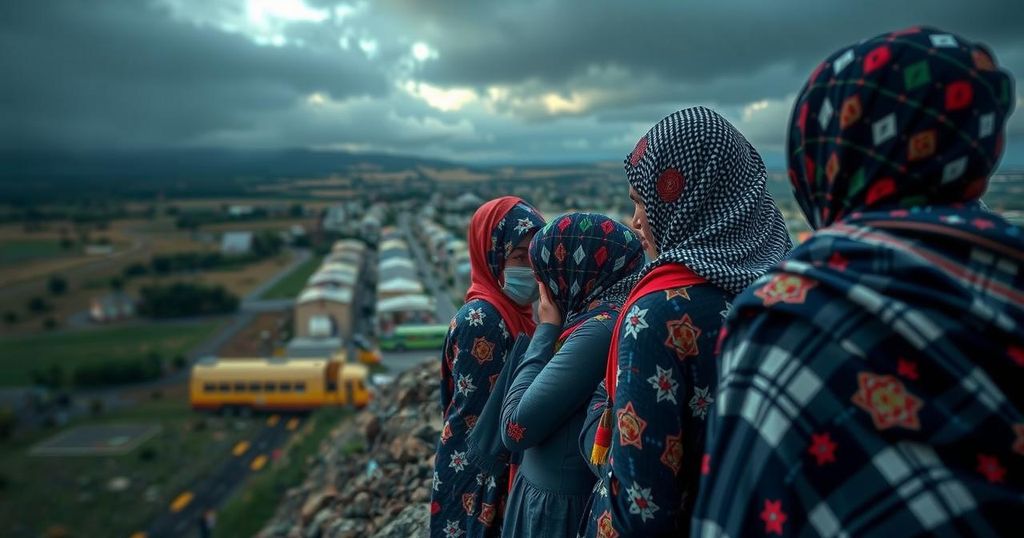The UN Refugee Agency (UNHCR) has reported a surge in global displacement due to climate change, with over 120 million people affected—three-quarters living in areas severely impacted by climate hazards. Filippo Grandi emphasized the severe consequences of climate change on vulnerable populations, urging action to address the dual crises of climate and conflict. The report aligns with discussions at COP29 in Azerbaijan, highlighting the urgent need for increased climate financing to support affected nations.
The United Nations has issued a grave warning regarding the escalating climate crisis and its role in displacing populations globally. A recent report from the UN Refugee Agency (UNHCR) indicates that climate hazards are contributing to a dramatic increase in the number of forcibly displaced individuals, now surpassing 120 million. Alarmingly, three-quarters of these displaced persons reside in nations significantly affected by climate-related threats. The report underscores the urgent need to address the intersection of conflict and climate change that exacerbates the suffering of vulnerable populations. The alarming rise in displaced individuals is closely tied to both climate change and conflict situations. Nearly 90 million of the displaced are individuals who live in regions facing extreme climate risks, including nations like Myanmar, Somalia, Sudan, and Syria. Filippo Grandi, the UN High Commissioner for Refugees, emphasized the harsh realities that climate change imposes on the world’s most vulnerable groups, stating that “the climate crisis is driving displacement in regions already hosting large numbers of people uprooted by conflict and insecurity.” For instance, approximately 700,000 people fleeing conflict in Sudan have crossed into Chad, a nation also grappling with climate vulnerabilities. In this context, the report highlights ongoing severe flooding in Sudan as an additional risk for those remaining. Moreover, significant numbers of refugees from Myanmar have sought asylum in Bangladesh, a country experiencing extreme weather conditions such as cyclones and flooding. Grace Dorong, a climate activist and former refugee, articulated the urgency of addressing climate-related displacement during a public discussion, stating, “I hope the voices of the people in this report help decision-makers to understand that if not addressed, forced displacement – and the multiplying effect of climate change – will get worse.” Her appeal reflects the pressing need for inclusive solutions that consider the experiences and voices of displaced individuals. The UN report coincides with the ongoing COP29 climate meeting in Azerbaijan, where representatives from nearly 200 countries convene to address climate-related challenges. However, the absence of high-level delegations from major nations, including the United States and China, casts a shadow over the effectiveness of the discussions. As the climate summit progresses, urgent calls for increased climate funding, especially for poorer countries, highlight the necessity of global cooperation in mitigating climate impacts.
The intersection of climate change and conflict has increasingly become a focal point for humanitarian discussions, emphasizing the profound impact of environmental degradation on human displacement. As climate environments worsen, the risk of conflict heightens, creating a cycle of vulnerability for millions. Reports like the one from the UNHCR serve to illustrate the critical need for global awareness and response efforts to manage the growing numbers of individuals displaced due to these dual crises. Effective climate policies and humanitarian interventions are imperative to address the challenges posed by climate change, particularly in regions already burdened by conflict.
In summary, the UNHCR report reveals a pressing global crisis where climate change is compounding the already significant challenge of conflict-driven displacement. With over 120 million people currently displaced, it is essential for global leaders and organizations to recognize the implications of climate-related hazards. Acting decisively, with input from affected communities, will be key to developing sustainable solutions that address the root causes of forced displacement and support those in greatest need.
Original Source: www.aljazeera.com







